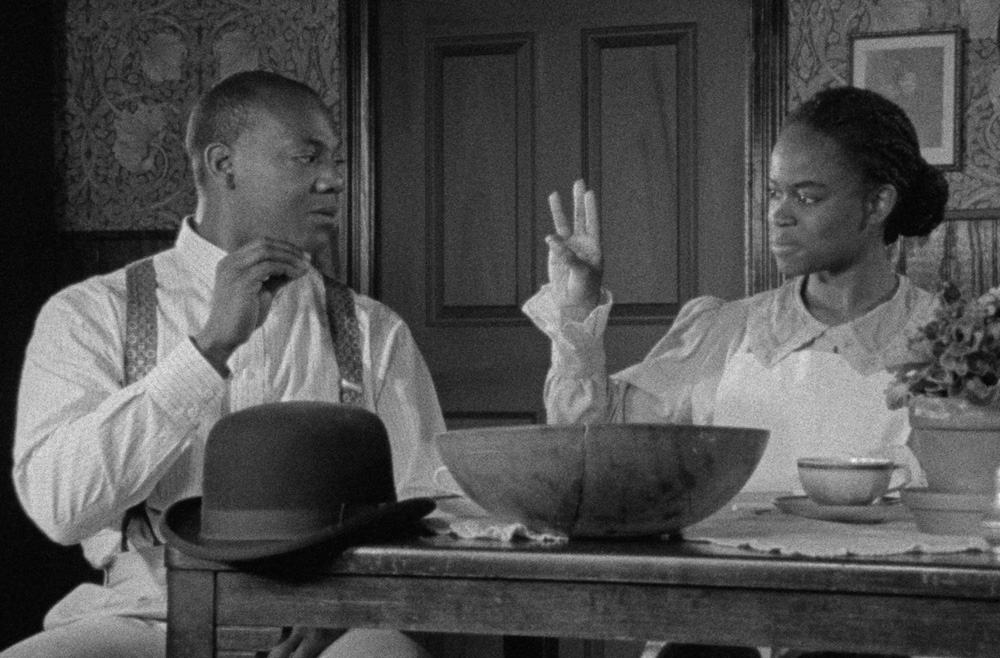It’s a truly selfless gesture when Malindy Brown (Michelle A. Banks) asks Arthur Jones (John Earl Jenks), a man she’s met strolling along the beach with a mandolin, to play a little something in “Compensation” to rouse her friend Tildy (Nirvana Cobb) from an afternoon nap. Malindy has been deaf since birth, so the sound itself won’t make it to her, but she can see the joy of Arthur having an audience to play for and the pleasant awakening for her friend, making her more content when the world around her a bit more harmonious.
That delightful stirring sensation is how it feels generally to know that Zeinabu irene Davis’ feature directorial debut is back in circulation after being largely neglected upon its initial release in 1999, with premieres at the Toronto Film Festival and Sundance where potential distributors couldn’t be bothered with a monochrome mostly dialogue-free film with a Black cast. What once made the film inscrutable for those with an eye towards its commerciality can now be seen as the clever touches that have allowed it to endure when Davis shrewdly thought about a narrative from all angles to design an experience in which no one is left out, least of all those just wanting a good time at the movies or those who prefer their cinema more avant garde.
A romance first and foremost, Davis and writer Marc Arthur Chéry create parallel narratives in Chicago at the turn of the twentieth century and nearly a hundred years later as Banks and Jones not only play Malindy and Arthur in simpler times, but Malaika and Nico in the late 1990s. Circumstances may have changed in the intervening decades when Malindy contends with the segregation of schools for the deaf, leaving her without a place to get a proper education, but complications of the heart prove timeless as communication between the couples may have an obvious obstacle when Malindy and Malaika are hard of hearing with partners who don’t know how to speak sign language, but that gives way to conversations that are difficult to have in other ways.
Being drawn into “Compensation” is akin to how the characters on screen get to know each other coming from different worlds. Davis will roam around still pictures from the early 1900s to set the scene, with the images coming alive due to the ambient sounds they’re accompanied with, but those that can’t hear are equally welcomed with open captions and the patience with which Davis allows all to settle into the narrative. The director knows how to stage a meet cute, showing how Malaika won’t be deterred from her daily practice of Tai Chi by Nico’s entreaties until he surprises her by learning rudimentary sign language, and seduces an audience just as readily when employing formal conceits that could be distancing to bring them closer, such as turning title cards typical of the silent era into expressions of characters’ personalities when the fonts so vividly reflect who they are.
A preference for practicality over all other considerations is hinted at when Malaika tells Nico she’d rather see “The Last Action Hero” over “Sleepless in Seattle” since there’d be far less dialogue to follow when staring at a movie marquee on a date and “Compensation” never feels pretentious as a result, even as Davis clearly brings an artistry to how the story unfolds across time. Yet as its characters ask each other to meet one another halfway with love shown between unexpected couples by how much they’re willing to accept one another’s differences and adapt to one another, the film’s gentle demands that an audience places their trust in something a little more radically formal becomes enormously moving when the rewards become so obvious on screen and off. There may be plenty of divisions revealed simply in what’s heard and seen, but what resonates is the work it takes to build bridges.
“Compensation” opens on February 21st in New York at Film at Lincoln Center’s Elinor Bunin Monroe Film Center and February 28th in Chicago at the Gene Siskel Film Center before expanding across the U.S. and Canada in the weeks ahead. A full list of theaters and dates is here.




